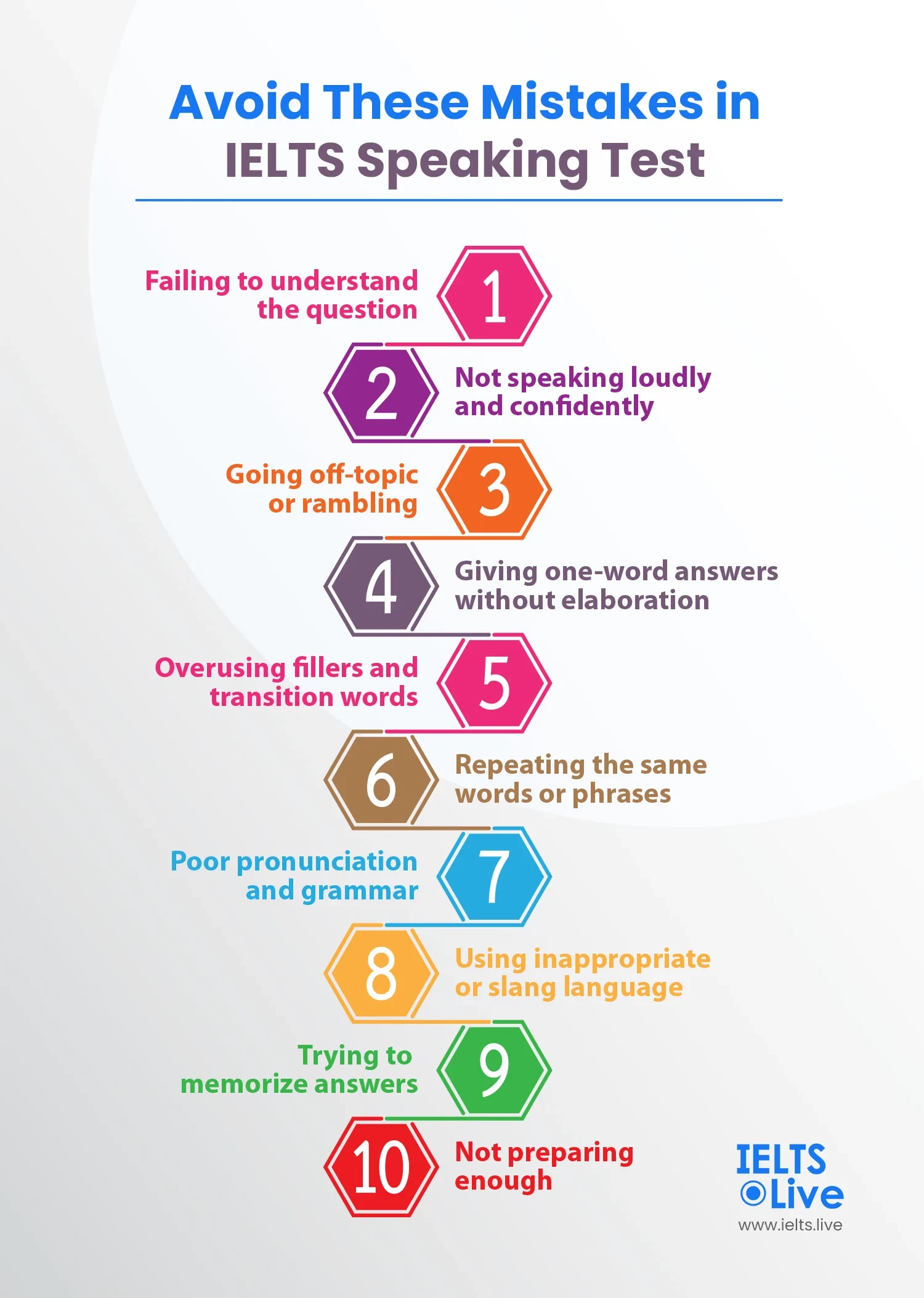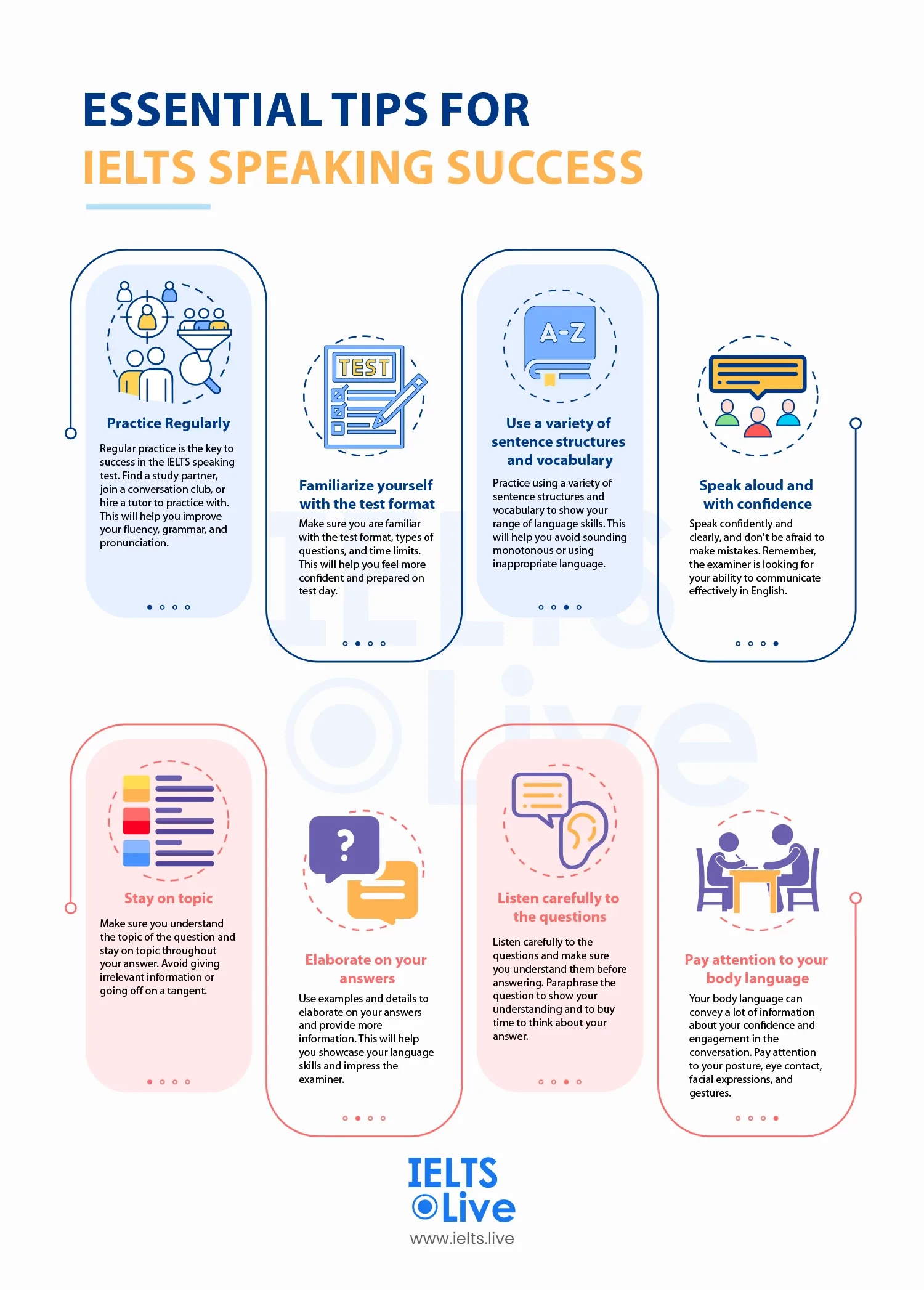
The IELTS Speaking Test is a crucial part of the IELTS exam that can make or break your chances of achieving your desired band score. As a non-native speaker, it's essential to be aware of the common mistakes that many IELTS candidates make in the Speaking Test and know how to avoid them. In this post, we will discuss some common mistakes and provide you with some practical tips and strategies to help you ace the Speaking Test.
You may also like: Revolutionize Your IELTS Speaking Test: The Unconventional Strategies That Guarantee Success!

1. Failing to understand the question
Many IELTS candidates make the mistake of not fully understanding the question. This can happen if you don't listen carefully to the examiner or if you're too nervous and anxious. To avoid this mistake, make sure you listen to the question attentively and ask for clarification if necessary. Paraphrase the question in your own words to make sure you have understood it correctly.
2. Not speaking loudly and confidently
Speaking confidently and clearly is crucial in the IELTS Speaking Test. If you speak too softly or mumble, the examiner may have difficulty understanding you, and this can affect your score. To avoid this mistake, practice speaking loudly and clearly in a conversational tone. Stand up straight and take deep breaths to calm your nerves.
3. Going off-topic or rambling
Many IELTS candidates make the mistake of going off-topic or rambling, especially in Part 2 of the Speaking Test where you need to speak for 2 minutes on a given topic. To avoid this mistake, plan your answer beforehand, and structure it logically. Use simple and clear language, and focus on answering the question rather than giving unnecessary details.
4. Giving one-word answers without elaboration
Giving short answers without elaboration is another common mistake that many IELTS candidates make. To avoid this mistake, try to provide detailed and relevant answers that showcase your vocabulary and fluency. Use examples and explanations to support your ideas, and try to give your opinion wherever possible.
5. Overusing fillers and transition words
Fillers and transition words such as "um", "ah", "like", and "you know" can make you sound less confident and less fluent. To avoid this mistake, try to speak more slowly and pause for a moment to collect your thoughts. Use natural transition words such as "well", "however", "in addition", etc., but don't overuse them.
6. Repeating the same words or phrases
Repeating the same words or phrases can make you sound monotonous and boring. To avoid this mistake, try to use synonyms and alternative expressions to vary your language. Make a conscious effort to use different vocabulary and expressions, but don't use words that you're not sure of.
7. Poor pronunciation and grammar
Poor pronunciation and grammar can significantly affect your score in the IELTS Speaking Test. To avoid this mistake, practice your pronunciation and intonation regularly. Record yourself speaking and listen to it to identify areas that need improvement. Work on your grammar by reading and writing regularly.
8. Not using a variety of sentence structures
Using the same sentence structure throughout the speaking test can become monotonous and repetitive. It is important to vary the length and structure of your sentences to show your range of language skills. You can use complex sentences, compound sentences, or simple sentences to add variety.
9. Using inappropriate or slang language
This blunder can have serious consequences on your final score, as the IELTS Speaking test aims to assess your proficiency in using formal English appropriately and effectively. When you use slang or inappropriate language, you risk being misunderstood by the examiner, which can lead to confusion and a lower score.
Therefore, it's essential to use standard English and avoid using any slang or inappropriate language during the IELTS Speaking test. This means avoiding colloquialisms, regional expressions, and any language that may be considered too informal or impolite. Stick to using clear, concise, and formal language that is easy to understand and that will showcase your language skills in the best possible way.
10. Trying to memorize answers
While it may seem like a good idea to memorize answers in advance, it can actually do more harm than good.
Firstly, memorizing answers can make your responses sound robotic and unnatural. The IELTS Speaking test is designed to assess your ability to communicate effectively in English, not to test your memory. If you memorize answers, you risk sounding rehearsed and stilted, which can negatively impact your score.
Secondly, memorizing answers can also prevent you from fully engaging with the question and providing a relevant, coherent response. The IELTS Speaking test assesses your ability to communicate your ideas clearly and effectively, and if you're simply regurgitating memorized responses, you may miss important details and fail to answer the question properly.
11. Not preparing enough
Without adequate preparation, candidates may find themselves struggling to formulate their ideas and express themselves effectively. This can lead to hesitation, repetition, and poor coherence and cohesion in their responses, all of which can negatively impact their overall score.
In addition, without preparation, candidates may not be familiar with the structure and format of the speaking test, which can increase their anxiety levels and make it difficult to perform to the best of their abilities. They may also be less confident in their English language skills, which can lead to mistakes in grammar, pronunciation, and vocabulary.
12. Not using appropriate vocabulary
Using incorrect or inappropriate vocabulary can negatively impact your score. Make sure you are familiar with the vocabulary related to the topic and use it in the appropriate context. Avoid using slang or overly informal language in the speaking test.
13. Ignoring the importance of body language
Your body language can convey a lot of information about your confidence and engagement in the conversation. Avoid slouching, crossing your arms or legs, or fidgeting. Instead, maintain eye contact with the examiner, and use appropriate facial expressions and gestures to emphasize your points.
Now that you know the common mistakes candidates make in the IELTS speaking test, it's time to prepare yourself to avoid them. Here are some tips to help you avoid these mistakes and achieve a high score:

- Practice regularly: Regular practice is the key to success in the IELTS speaking test. Find a study partner, join a conversation club, or hire a tutor to practice with. This will help you improve your fluency, grammar, and pronunciation
- Familiarize yourself with the test format: Make sure you are familiar with the test format, types of questions, and time limits. This will help you feel more confident and prepared on test day.
- Use a variety of sentence structures and vocabulary: Practice using a variety of sentence structures and vocabulary to show your range of language skills. This will help you avoid sounding monotonous or using inappropriate language.
- Speak aloud and with confidence: Speak confidently and clearly, and don't be afraid to make mistakes. Remember, the examiner is looking for your ability to communicate effectively in English.
- Stay on topic: Make sure you understand the topic of the question and stay on topic throughout your answer. Avoid giving irrelevant information or going off on a tangent.
- Elaborate on your answers: Use examples and details to elaborate on your answers and provide more information. This will help you showcase your language skills and impress the examiner.
- Listen carefully to the questions: Listen carefully to the questions and make sure you understand them before answering. Paraphrase the question to show your understanding and to buy time to think about your answer.
- Pay attention to your body language: Your body language can convey a lot of information about your confidence and engagement in the conversation. Pay attention to your posture, eye contact, facial expressions, and gestures.
By following these tips and avoiding common mistakes, you can improve your performance and achieve a high score on the IELTS speaking test. Remember, practice makes perfect, so don't be afraid to make mistakes, and keep practising!






0 COMMENTS